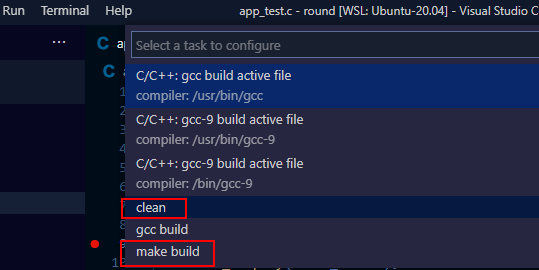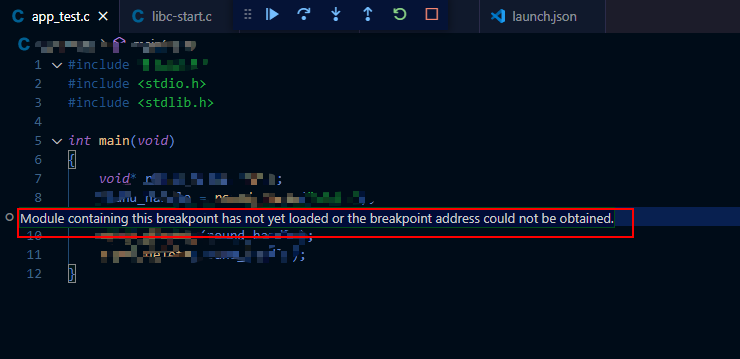VS code配置编译及debug环境
一. 在.vscode下建两个文件
1.1. tasks.json:配置编译
1.2. lunch.json配置debug
PS:附录中我提供源文件

二. 创建makefile,以便json调用
三. build
3.1. 打开源码文件
3.2. 编译
点击菜单上Terminal->config Task->make build
3.2. clean
点击菜单上Terminal->config Task->clean

四. Debug
4.1. 按F5开始debug(或按菜单上的Run)
4.2. 设置断点(在行前左击)

4.3. 如果运行时不执行断点,报信息如下
4.3.1. Module containing this breakpoint has not yet loaded or the breakpoint address not be obtained
如果你编译没有加-g时,调试就会出现这个信息

五. 附录
5.1. tasks.json

{ "version": "2.0.0", "tasks": [ { "label": "make build", "command": "/usr/bin/make", "args": [ "all" ], "type": "shell", "problemMatcher": [], "group": { "kind": "build", "isDefault": true } }, { "label": "clean", "command": "/usr/bin/make", "args": [ "clean" ], "type": "shell" }, { "type": "shell", "label": "gcc build", "command": "/usr/bin/gcc", "args": [ "-g", "${file}", "-o", "${fileDirname}/main" ], "options": { "cwd": "${workspaceFolder}" }, "problemMatcher": [ "$gcc" ], "group": "build" } ] }
5.2. lunch.json

{ // Use IntelliSense to learn about possible attributes. // Hover to view descriptions of existing attributes. // For more information, visit: https://go.microsoft.com/fwlink/?linkid=830387 "version": "0.2.0", "configurations": [ { "name": "build debug", "type": "cppdbg", "request": "launch", "program": "${fileDirname}/main", "args": [], "stopAtEntry": true, "cwd": "${workspaceFolder}", "environment": [], "externalConsole": false, "MIMode": "gdb", "setupCommands": [ { "description": "Enable pretty-printing for gdb", "text": "-enable-pretty-printing", "ignoreFailures": true } ], //"preLaunchTask": "build", "miDebuggerPath": "/usr/bin/gdb" } ] }
5.3 Makefile

CC = /usr/bin/gcc LD = /usr/bin/ld # 正则表达式表示目录下所有.c文件,相当于:SRCS = main.c a.c b.c SRCS = $(wildcard *.c) # OBJS表示SRCS中把列表中的.c全部替换为.o,相当于:OBJS = main.o a.o b.o OBJS = $(patsubst %c, %o, $(SRCS)) INC = -I ./ CFLAGS = # 可执行文件的名字 TARGET = main # .PHONE伪目标,具体含义百度一下一大堆介绍 .PHONY:all debug clean # 要生成的目标文件 all: $(TARGET) # 第一行依赖关系:冒号后面为依赖的文件,相当于Hello: main.o a.o b.o # 第二行规则:$@表示目标文件,$^表示所有依赖文件,$<表示第一个依赖文件 $(TARGET): $(OBJS) $(CC) -o $@ $^ # 上一句目标文件依赖一大堆.o文件,这句表示所有.o都由相应名字的.c文件自动生成 %o:%c $(CC) -c $^ $(CFLAGS) $(INC) # make clean删除所有.o和目标文件 clean: rm -f $(OBJS) $(TARGET)




 浙公网安备 33010602011771号
浙公网安备 33010602011771号